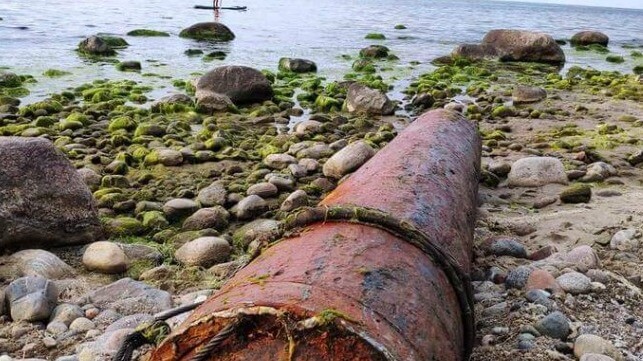Russia Disrupts Kazakhstan's Oil Exports With Sudden UXO Survey

Effective this week, Russian officials will intermittently shut down the Black Sea terminal that handles two thirds of Kazakhstan's oil exports in order to find unexploded ordnance on the seabed, state-owned outlet Kommersant reports.
The Caspian Pipeline Consortium (CPC) has operated a connector pipeline between landlocked Kazakhstan and the Black Sea port of Novorossiysk, Russia for more than two decades. It has a capacity of up to 1.4 million bpd, equal to more than two percent of global seaborne oil trade.
On Sunday, state-owned Kommersant reported that dozens of potential pieces of unexploded ordnance have just now been discovered near the CPC terminal. They must be removed, and the terminal's operations will be disrupted beginning June 20.
"The start of the special operation [invasion of Ukraine] did not allow us to complete all the [survey] work," a port official told Kommersant. "Some of these items are known to be located less than 100 meters from the subsea pipeline to the [loading buoy]. The work is really very dangerous."
According to local media, EOD teams in Novorossiysk have been finding and clearing unexploded WWII-era bombs in the area for most of the past week, including three torpedoes in the main harbor.
Kazakh Energy Minister Bolat Akchulakov told media that he does not believe that the disruption will have a material effect on exports, since one loading buoy will remain in operation.
If Kommersant's report is accurate, it would the second shutdown of the CPC terminal at Novorossiysk since March. Two of the terminal's three mooring buoys sustained damage in a storm in late March, according to Kommersant, and the outlet reports that the partial shutdown took one million bpd off the world market for three weeks. Kazakhstan says that full operations were only restored in late May.
Whether or not the new shutdown is needed for safety, its timing has raised questions among political analysts. It follows just days after Kazakh President Kassym-Jomart Tokayev said that he would not recognize two pro-Russian breakaway territories in eastern Ukraine.
In comments at the St. Petersburg Economic Forum last week, in the presence of Russian President Vladimir Putin and top Russian propagandist Margarita Simonyan, Tokayev said that Kazakhstan cannot recognize the so-called Donetsk People's Republic and Luhansk People's Republic (DPR and LPR).
"It has been calculated that if the right of nations to self-determination were actually implemented across the globe, then instead of the 193 states that now make up the UN, there would be more than 500 or 600 states on Earth. Naturally, it would be chaos," Tokayev said. "For this reason we do not recognize either Taiwan, or Kosovo, or South Ossetia, or Abkhazia. Obviously, this principle will apply to quasi-state associations, which, in our opinion, is what Luhansk and Donetsk are."
The two breakaway regions were created during the first Russian invasion of Ukraine in 2014. Russia recognized both as independent states in February, just before it invaded Ukraine for the second time. Moscow is widely believed to hold administrative control over the DPR and LPR.
Russia's critics have long warned that the Kremlin could use energy infrastructure for leverage. Last week, France experienced a sudden termination of all Russian gas deliveries, two days after French President Emmanuel Macron declared support for Ukraine's EU candidacy.

that matters most
Get the latest maritime news delivered to your inbox daily.
For Kazakhstan, the risk of Russian interference may extend beyond economic disruption. A number of prominent Russian officials and state media commentators have recently questioned Kazakhstan's sovereignty; the nation was once part of the Soviet Union (Russia), and Russian MP Konstantin Zatulin and pundit Tigran Keosayan have tacitly suggested that Kazakhstan could receive the same treatment as Ukraine.
Last week, Putin himself suggested that the lands of the Soviet Union - including Kazakhstan - are part of "historical Russia." Years earlier, in 2014, Putin suggested that Kazakhstan had “created a state on territory where no state had ever existed.”
